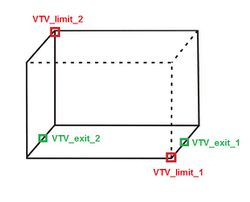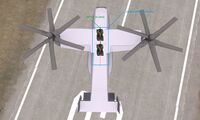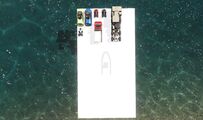Vehicle in Vehicle Transport – Arma 3
Jump to navigation
Jump to search
Killzone Kid (talk | contribs) (→enableVehicleCargo: vehicleCargoEnabled) |
Lou Montana (talk | contribs) m (Text replacement - "overriden" to "overridden") |
||
| (23 intermediate revisions by 6 users not shown) | |||
| Line 1: | Line 1: | ||
[[ | {{TOC|side}} | ||
[[Arma 3: Vehicle in Vehicle Transport|Vehicle in Vehicle Transport]] functionality was added in Arma 3 Apex expansion. | |||
For proper function it needs suitable transport vehicle with cargo space defined in model and in config. | |||
Transported vehicles on the other hand needs no special treatment - important is only their size (estimated from bounding box) and weight. | |||
There are multiple config parameters for both transport and transported vehicles which can be used for further tweaking of functionality. | |||
== Scripting commands== | == Scripting commands == | ||
* [[:Category:Command Group: Vehicle in Vehicle Transport|Command Group: Vehicle in Vehicle Transport]] | |||
== Transport/transported Vehicles == | |||
=== Transported Vehicles === | |||
* only dimensions and weight of vehicle/object are important parameters | * only dimensions and weight of vehicle/object are important parameters | ||
* if size is not defined in config, bounding box is used | * if size is not defined in config, bounding box is used | ||
* mass of loaded vehicle(s) is added to transport vehicle | * mass of loaded vehicle(s) is added to transport vehicle | ||
* specific vehicles | * <syntaxhighlight lang="cpp" inline>canBeTransported = 0;</syntaxhighlight> disables possibility for this specific vehicle to be transported in other vehicles | ||
* there are also optional parameters for parachute | * there are also optional parameters for parachute | ||
* all these parameters are overriding transport vehicle config - if they are not present, default values are used (vehicle can be transported and parachute defined in transport vehicle is used) | * all these parameters are overriding transport vehicle config - if they are not present, default values are used (vehicle can be transported and parachute defined in transport vehicle is used) | ||
'' | '''Transported''' Vehicle config example: | ||
<syntaxhighlight lang="cpp"> | <syntaxhighlight lang="cpp"> | ||
class VehicleTransport | class VehicleTransport | ||
{ | { | ||
class Cargo | |||
{ | |||
parachuteClass = B_Parachute_02_F; // Type of parachute used when dropped in air. When empty then parachute is not used. | |||
parachuteHeightLimit = 40; // Minimal height above terrain when parachute is used. | |||
canBeTransported = 1; // 0 (false) / 1 (true) | |||
dimensions[] = { "BBox_1_1_pos", "BBox_1_2_pos" }; // Memory-point-based override of automatic bounding box | |||
// or | |||
// dimensions[] = { { 0,0,0 }, { 3,2,1.5 } }; // alternatively, positions in model space (since 2.08) | |||
rotation = -90; // (optional) Defines in which direction the vehicle gets rotated when its loaded into ViV cargo and will only fit when rotated | |||
// Only -90 and 90 are supported. Since v2.08 | |||
}; | |||
}; | }; | ||
</syntaxhighlight> | </syntaxhighlight> | ||
[[File:cargoLimits.jpg|250px|thumb|Example of defined cargo space with two exits]] | |||
=== Transport Vehicles === | |||
* functionallity is not restricted to vehicle type | * functionallity is not restricted to vehicle type | ||
* name of memory points placed on model must be same as the ones used in config | * name of memory points placed on model must be same as the ones used in config | ||
| Line 53: | Line 51: | ||
* parachute models must be defined for dropping cargo in air | * parachute models must be defined for dropping cargo in air | ||
Transport Vehicle config example: | |||
<syntaxhighlight lang="cpp"> | <syntaxhighlight lang="cpp"> | ||
class VehicleTransport | class VehicleTransport | ||
{ | { | ||
class Carrier | |||
{ | |||
cargoBayDimensions[] = { "VTV_limit_1", "VTV_limit_2" }; // Memory points in model defining cargo space | |||
// or | |||
// cargoBayDimensions[] = { {0,0,0}, {10,10,10} }; // alternatively, positions in model space (since 2.08) | |||
disableHeightLimit = 1; // If set to 1 disable height limit of transported vehicles | |||
maxLoadMass = 200000; // Maximum cargo weight (in Kg) which the vehicle can transport | |||
cargoAlignment[] = { "front", "left" }; // Array of 2 elements defining alignment of vehicles in cargo space. | |||
// Possible values are left, right, center, front, back. Order is important. | |||
cargoSpacing[] = { 0, 0.15, 0 }; // Offset from X,Y,Z axes (in metres) | |||
exits[] = { "VTV_exit_1", "VTV_exit_2" }; // Memory points in model defining loading ramps, could have multiple | |||
// or | |||
// exits[] = { {5,0,0}, {5,10,0} }; // alternatively, positions in model space (since 2.08) | |||
unloadingInterval = 2; // Time between unloading vehicles (in seconds) | |||
loadingDistance = 10; // Maximal distance for loading in exit point (in meters). | |||
loadingAngle = 60; // Maximal sector where cargo vehicle must be to for loading (in degrees). | |||
parachuteClassDefault = "B_Parachute_02_F"; // Type of parachute used when dropped in air. Can be overridden by parachuteClass in Cargo. | |||
parachuteHeightLimitDefault = 50; // Minimal height above terrain when parachute is used. Can be overridden by parachuteHeightLimit in Cargo. | |||
class CargoTypeWhitelist // Whitelist. If this isn't empty, only listed vehicles (isKindOf) can load into (since 2.10) | |||
{ | |||
Boat_F = 1; // In this case the transporter only carry boats, not cars or tanks etc | |||
}; | |||
}; | |||
}; | }; | ||
</syntaxhighlight> | </syntaxhighlight> | ||
== Sorting | == Cargo Space Vehicle Sorting == | ||
* vehicles in cargo space can be centred and aligned | * vehicles in cargo space can be centred and aligned | ||
* handled via combined parameter "CargoAlignment" - it | * handled via combined parameter "CargoAlignment" - it is an array of 2 elements | ||
* Values can be front, back, center, left, right. Order of them is important. | * Values can be front, back, center, left, right. Order of them is important. | ||
| Line 87: | Line 96: | ||
* if first one is "front" then front part of transport will be filled first. If then second word is left, it will be filled from left side, but still front first. | * if first one is "front" then front part of transport will be filled first. If then second word is left, it will be filled from left side, but still front first. | ||
*VTOL example would be "center" and "front" so vehicles would be inserted in center line from front to back. | * VTOL example would be "center" and "front" so vehicles would be inserted in center line from front to back. | ||
* Ferry example would be "left" and "front" so vehicles should loaded form top left corner to back | * Ferry example would be "left" and "front" so vehicles should loaded form top left corner to back. | ||
<gallery widths=300px> | <gallery widths="300px"> | ||
File:quad.jpg|Example 1: Two vehicles, horizontally centered in cargo space|alt=alt language | File:arma3 ViV quad example.jpg|Example 1: Two vehicles, horizontally centered in cargo space|alt=alt language | ||
File:ship.jpg|Example 2: Multiple vehicles loaded, automatically sorted and aligned to top left corner of cargo space|alt=alt language | File:arma3 ViV ship example.jpg|Example 2: Multiple vehicles loaded, automatically sorted and aligned to top left corner of cargo space|alt=alt language | ||
</gallery> | </gallery> | ||
{{GameCategory|arma3|Tutorials}} | |||
{{GameCategory|arma3|Vehicle Configuration}} | |||
Latest revision as of 14:35, 9 November 2023
Vehicle in Vehicle Transport functionality was added in Arma 3 Apex expansion. For proper function it needs suitable transport vehicle with cargo space defined in model and in config. Transported vehicles on the other hand needs no special treatment - important is only their size (estimated from bounding box) and weight. There are multiple config parameters for both transport and transported vehicles which can be used for further tweaking of functionality.
Scripting commands
Transport/transported Vehicles
Transported Vehicles
- only dimensions and weight of vehicle/object are important parameters
- if size is not defined in config, bounding box is used
- mass of loaded vehicle(s) is added to transport vehicle
canBeTransported = 0;disables possibility for this specific vehicle to be transported in other vehicles- there are also optional parameters for parachute
- all these parameters are overriding transport vehicle config - if they are not present, default values are used (vehicle can be transported and parachute defined in transport vehicle is used)
Transported Vehicle config example:
class VehicleTransport
{
class Cargo
{
parachuteClass = B_Parachute_02_F; // Type of parachute used when dropped in air. When empty then parachute is not used.
parachuteHeightLimit = 40; // Minimal height above terrain when parachute is used.
canBeTransported = 1; // 0 (false) / 1 (true)
dimensions[] = { "BBox_1_1_pos", "BBox_1_2_pos" }; // Memory-point-based override of automatic bounding box
// or
// dimensions[] = { { 0,0,0 }, { 3,2,1.5 } }; // alternatively, positions in model space (since 2.08)
rotation = -90; // (optional) Defines in which direction the vehicle gets rotated when its loaded into ViV cargo and will only fit when rotated
// Only -90 and 90 are supported. Since v2.08
};
};
Transport Vehicles
- functionallity is not restricted to vehicle type
- name of memory points placed on model must be same as the ones used in config
- cargo space can have multiple exit points
- loading area can be defined
- parachute models must be defined for dropping cargo in air
Transport Vehicle config example:
class VehicleTransport
{
class Carrier
{
cargoBayDimensions[] = { "VTV_limit_1", "VTV_limit_2" }; // Memory points in model defining cargo space
// or
// cargoBayDimensions[] = { {0,0,0}, {10,10,10} }; // alternatively, positions in model space (since 2.08)
disableHeightLimit = 1; // If set to 1 disable height limit of transported vehicles
maxLoadMass = 200000; // Maximum cargo weight (in Kg) which the vehicle can transport
cargoAlignment[] = { "front", "left" }; // Array of 2 elements defining alignment of vehicles in cargo space.
// Possible values are left, right, center, front, back. Order is important.
cargoSpacing[] = { 0, 0.15, 0 }; // Offset from X,Y,Z axes (in metres)
exits[] = { "VTV_exit_1", "VTV_exit_2" }; // Memory points in model defining loading ramps, could have multiple
// or
// exits[] = { {5,0,0}, {5,10,0} }; // alternatively, positions in model space (since 2.08)
unloadingInterval = 2; // Time between unloading vehicles (in seconds)
loadingDistance = 10; // Maximal distance for loading in exit point (in meters).
loadingAngle = 60; // Maximal sector where cargo vehicle must be to for loading (in degrees).
parachuteClassDefault = "B_Parachute_02_F"; // Type of parachute used when dropped in air. Can be overridden by parachuteClass in Cargo.
parachuteHeightLimitDefault = 50; // Minimal height above terrain when parachute is used. Can be overridden by parachuteHeightLimit in Cargo.
class CargoTypeWhitelist // Whitelist. If this isn't empty, only listed vehicles (isKindOf) can load into (since 2.10)
{
Boat_F = 1; // In this case the transporter only carry boats, not cars or tanks etc
};
};
};
Cargo Space Vehicle Sorting
- vehicles in cargo space can be centred and aligned
- handled via combined parameter "CargoAlignment" - it is an array of 2 elements
- Values can be front, back, center, left, right. Order of them is important.
Examples:
- if first one is "front" then front part of transport will be filled first. If then second word is left, it will be filled from left side, but still front first.
- VTOL example would be "center" and "front" so vehicles would be inserted in center line from front to back.
- Ferry example would be "left" and "front" so vehicles should loaded form top left corner to back.


